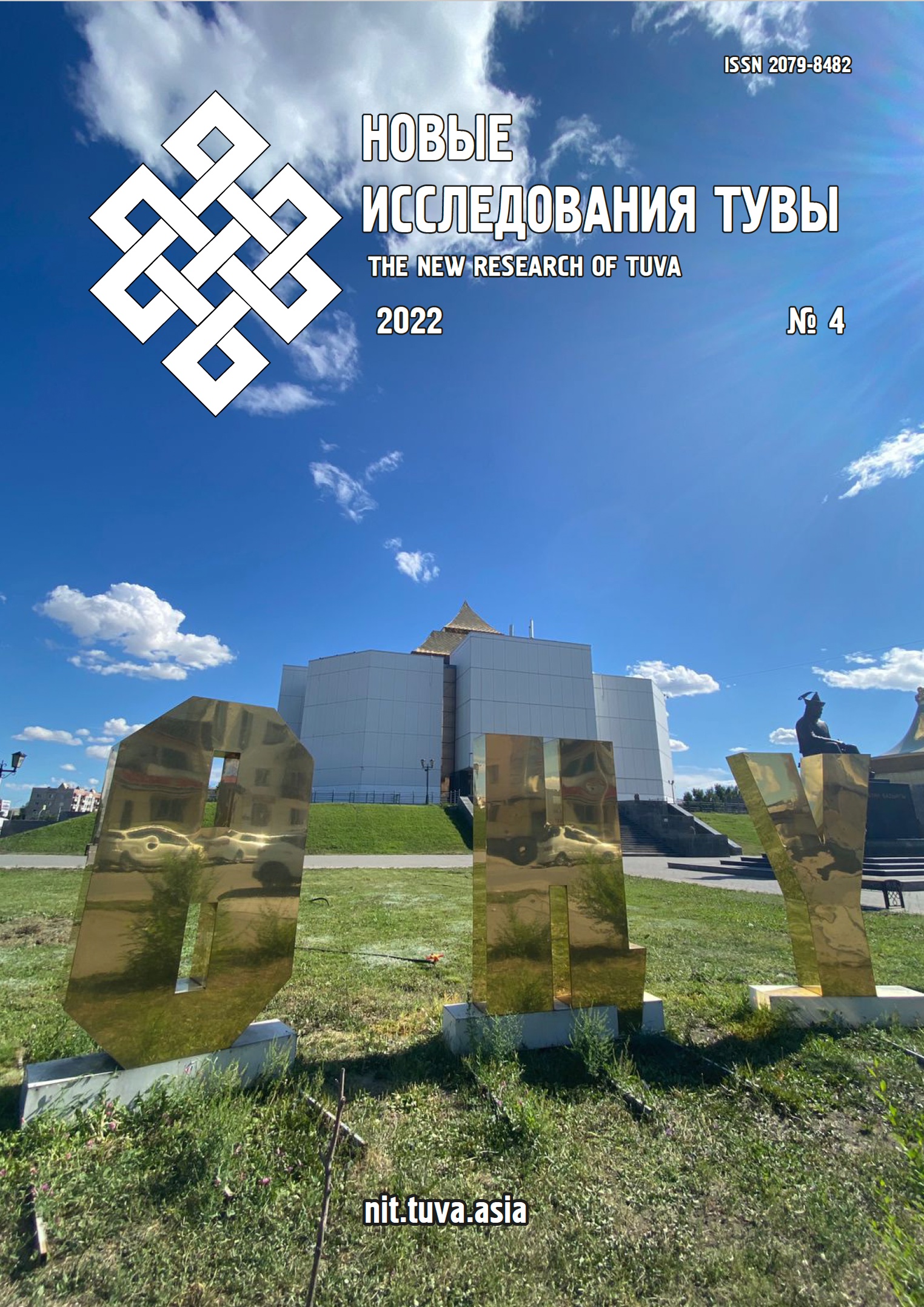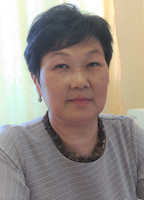Popular superstitious beliefs of the Tuvans: Typology and features
DOI:
https://doi.org/10.25178/nit.2022.4.16Keywords:
Tuvan language; Tuvans; Tuvan folklore; superstitious beliefs; paroemiaAbstract
The article examines such a small genre of Tuvan folklore as superstitious beliefs (demdek) and provides insight into their linguistic and culturological role for revealing universal and ethnic components in the language worldview of the Tuvans. We used information recorded from elderly Tuvans and translated it into Russian as the source data for the research. We also turned to the publication by M. B. Kenin-Lopsan. It was published in Russian, so we made a reverse translation of the given folk beliefs into the Tuvan language.
Relying on classifications developed in Russian folklore studies, the authors have divided the folk superstitious beliefs of the Tuvans into the following types: predictive, day-to-day, relating to dreams, aesthetic, hygienic superstitions, as well as examples of omens associated with celestial bodies. Each of these types of folk beliefs is presented in the examples (with translations). There is also a division into three main groups: predictive, day-to-day, and those related to dreams. The most common group is predictive superstitions. Popular beliefs are constructed according to the formula “forecast — prediction” and relate to certain unambiguous facts.
References
Alefirenko, N. F. (2010) Lingvokul'turologiia : tsennostno-smyslovoe prostranstvo iazyka [Linguoculturology: Value-semantic space of language] : A study guide. Moscow, Flinta ; Nauka. 224 p. (In Russ.).
Bredis, M. A. and Ivanov, E. E. (2022) Proverbial'nye faktory perevoda tuvinskikh poslovits v aspekte normativnoi i polilingval'noi paremiografii (na fone russkogo i angliiskogo iazykov) [Proverbial factors in translating Tuvan proverbs in the light of normative and poly-lingual paremiography (as contrasted to Russian and English languages)]. New Research of Tuva, no. 1, pp. 17–36. (In Russ.). DOI: https://doi.org/10.25178/nit.2022.1.2
Bochina, T. G. (2022) Kontrast v tuvinskikh poslovitsakh [Contrast in Tuvan proverbs]. New Research of Tuva, no. 1, pp. 37–46. (In Russ.). DOI: https://doi.org/10.25178/nit.2022.1.3
Darzha, V. Ch. (2003) Loshad' v traditsionnoi praktike tuvintsev-kochevnikov [The horse in the traditional practice of the Tuvan nomads] / ed. by G. N. Kurbatskii. Kyzyl, TuvIENR SB RAS. 184 p. (In Russ.).
Darzha, V. K. (2007) Tainy mirovozzreniia tuvintsev-nomadov [Secrets of the Tuvan nomad worldview]. Kyzyl, Tuvan Publishing House. 255 р. (In Russ.)
Egorova, A. I., Kondakova, A. P. and Kuzhuget, M. A. (2020) Gendernye stereotipy v tuvinskikh poslovitsakh i pogovorkakh [Gender stereotypes in Tuvan proverbs and sayings]. New Research of Tuva, no. 1, pp. 19–34. (In Russ.). DOI: https://doi.org/10.25178/nit.2020.1.2
Zavyalova, E. E. (2013) Primety kak fol'klornyi zhanr: opyt sistematizatsii [Superstitious beliefs as a folklore genre: An experience of systematization]. Znanie. Ponimanie. Umenie, no. 2, pp. 187–193. (In Russ.).
Zinovieva, E. I. and Alyoshin, A. S. (2022) Sem'ia v komparativnykh paremiiakh tuvinskogo, shvedskogo i russkogo iazykov [The family in comparative paremies of Tuvan, Swedish and Russian languages]. New Research of Tuva, no. 1, pp. 131–145. (In Russ.). DOI: https://doi.org/10.25178/nit.2022.1.9
Ivanov, E. E., Marfina, Zh. V. and Shkuran, O. V. (2022) Nominatsii zhivotnykh v tuvinskikh poslovitsakh i pogovorkakh: aspekty realizatsii i problematika izucheniia [Animal nouns in Tuvan proverbs and sayings: problems of studying and aspects of functioning]. New Research of Tuva, no. 1, pp. 47–68. (In Russ.). DOI: https://doi.org/10.25178/nit.2022.1.4
Katanov, N. F. (1903) Opyt izsledovaniia uriankhaiskago iazyka, s ukazaniem glavneishikh rodstvennykh otnoshenii ego k drugim iazykam tiurkskago kornia [An essay on the Uryankhai language, indicating the most important kinship ties between it and the other languages of the Turkic root]. Kazan, Tipo-litografiia Imperatorskogo universiteta. 1600 p. (In Russ.).
Kenin-Lopsan, M. B. (2000) Tyva changchyl [Tuvan traditions]. Kyzyl, Novosti Tuvy. 252 p. (In Tuv.).
Kenin-Lopsan, M. B. (2021) Traditsionnaia kul'tura tuvintsev [Traditional culture of the Tuvans]. Kyzyl, Raduga Tuvy ; Tuvan Book Publishing House. 232 p. (In Russ.).
Kovshova, M. L. (2019) Lingvokul'turologicheskii analiz idiom, zagadok, poslovits i pogovorok: Antropologicheskii kod kul'tury [Linguoculturological analysis of idioms, riddles, proverbs and sayings: The anthropological code of culture]. Moscow, Lenand. 400 p. (In Russ.).
Kolesnikova, S. M. (2022) Gradual'naia semantika russkikh i tuvinskikh poslovits [Gradable semantics in Russian and Tuvan proverbs]. New Research of Tuva, no. 1, pp. 90–103. (In Russ.). DOI: https://doi.org/10.25178/nit.2022.1.6
Kuzhuget, Sh. Yu., Suvandii, N. D. and Lamazhaa, Ch. K. (2021) Problemy perevoda kontseptov kul'tury na drugoi iazyk: na primere tuvinskikh kontseptov kul'tury [The problems of translating cultural concepts into another language: On the example of Tuvan cultural concepts]. Polylinguality and Transcultural Practices, vol. 18, no. 4, pp. 405–420. (In Russ.). DOI: https://doi.org/10.22363/2618-897X-2021-18-4-405-420
Kurbatskii, G. N. (2001) Tuvintsy v svoem fol'klore (istoriko-etnograficheskie aspekty tuvinskogo fol'klora) [Tuvans in their folklore: Historical and ethnographic aspects of Tuvan folklore)]. Kyzyl, Tuvan Book Publishing House. 464 p. (In Russ.).
Lomakina, O. V. (2022) Tuvinskaia paremiologiia: lingvokul'turologicheskii i lingvoaksiologicheskii potentsial [Tuvan paremiology: its linguoculturological and linguoaxiological potential]. New Research of Tuva, no. 1, pp. 6–16. (In Russ.). DOI: https://doi.org/10.25178/nit.2022.1.1
Moskvitheva, S. A., Aleksandrova, O. I. and Ebzeeva, Yu. N. (2022) Fol'klornye kul'turemy i struktura kul'turnykh reprezentatsii tuvintsev [Folklore culturemes in the structure of cultural representations of Tuvan people]. New Research of Tuva, no. 1, pp. 164–182. (In Russ.). DOI: https://doi.org/10.25178/nit.2022.1.11
Neliubova, N. Yu. (2022) Aksiologicheskie dominanty paremii kak tipologicheskie markery tuvinskoi, russkoi i frantsuzskoi etnokul'tur [Axiological dominants of paremies as typological markers in Russian, Tuvan and French ethnic cultures]. New Research of Tuva, no. 1, pp. 146–163 (In Russ.). DOI: https://doi.org/10.25178/nit.2022.1.10
Paremiologiia na perekrestkakh iazykov i kul'tur [Paremiology at the crossroads of languages and cultures] (2021) / ed. by E. E. Ivanov and O. V. Lomakina. Moscow, RUDN Publ. 246 p. (In Russ.).
Prosyannikova, O. I., Skorik, K. V. and Kuzhuget, Sh. Yu. (2022) Dialogichnost' obriadovoi poezii: sredstva realizatsii i funktsionirovanie v tuvinskikh blagopozhelaniiakh i algyshakh [The dialogism of ritual poetry and its expression and function in the Tuvan yoreels and algyshes]. New Research of Tuva, no. 1, pp. 69–89. (In Russ.). DOI: https://doi.org/10.25178/nit.2022.1.5
Radlov, V. V. (1893) Opyt slovarya tyurkskih narechij [An attempt of the dictionary of Turkic dialects]. St. Petersburg, Typography of the Academy of Sciences. 967 p. (In Russ.).
Sadova, T. S. (2021) Snogadaniia i rasskazy o snakh v russkom rechevom obikhode: lingvisticheskie zametki [Divination of dreams and stories about dreams in Russian everyday speech: Linguistic notes]. St. Petersburg, St. Petersburg State University Publishing House. 144 p. (In Russ.).
Seliverstova, E. I. (2022) Binarnye struktury v tuvinskikh poslovitsakh kak proiavlenie natsional'no-markirovannogo videniia mira [Binary structures in Tuvan proverbs as a manifestation of the nationally marked vision of the world]. New Research of Tuva, no. 1, pp. 115–130. (In Russ.). DOI: https://doi.org/10.25178/nit.2022.1.8
Soyan, A. M. and Ulamsuren, Ts. (2015) Obriadovaia poeziia etnicheskikh tuvintsev tsagaan-nuura [Ritual poetry of ethnic Tuvans in Tsagaan-Nuur]. Kazanskaia nauka, no. 10, pp. 206–208. (In Russ.).
Soyan, A. M. (2016) Nravstvennye tsennosti v poslovitsakh i pogovorkakh tsagan-nurskikh i usinskikh tuvintsev [Moral values in proverbs and sayings of the Tuvans in Tsagan-Nur and Usinsk]. Mir nauki, kul'tury i obrazovaniia, no. 6, pp. 373–375. (In Russ.).
Tatarintsev, B. I. (2002) Etimologicheskii slovar' tuvinskogo iazyka [An etymological dictionary of the Tuvan language] : in 4 vols. Novosibirsk, Nauka. Vol. II. 388 р. (In Russ.)
Tatarintsev, B. I. (2002) Etimologicheskii slovar' tuvinskogo iazyka [An etymological dictionary of the Tuvan language] : in 4 vols. Novosibirsk, Nauka. Vol. IV. 442 р. (In Russ.)
Kharchenko, V. K. and Tonkova, E. E. (2008) Lingvistika narodnoi primet [Linguistics of folk beliefs]. Belgorod, Publishing House “Belgorod Regional Printing House”. 224 p. (In Russ.).
Published
How to Cite
For citation:
Darzha U. A., Suvandii N. D. and Kuzhuget M. A. Narodnye primety tuvintsev: tipologiia i osobennosti [Popular superstitious beliefs of the Tuvans: Typology and features]. New Research of Tuva, 2022, no. 4, pp. 213-224 (In Russ.). DOI: https://doi.org/10.25178/nit.2022.4.16
Issue
Section

This work is licensed under a Creative Commons Attribution-NonCommercial 4.0 International License.

Author(s) license holder(s) grant rights for their work to the journal (grantee of a license) under the simple non-exclusive open license in accordance with Art. 1286.1 «Open license for a research work, work of literature or fine arts», Civil Code of the Russian Federation.
New Research of Tuva publishes articles under the Creative Commons Attribution-NonCommercial license (CC BY-NC).
Since it is an open license, author(s) reserve the right to upload the article to their institutional repository, submit it to another journal (if it allows republications), or republish it on their own website (in full, or in part).
However, several conditions apply here:
a) The republished version must always contain the name(s) and affiliation(s) of the author(s), the original title and the hyperlink to the original version on the New Research of Tuva website;
b) It must be in open access, free of charge, and no category of readers must be in any way whatsoever advantaged over general readership.
c) should the contribution be submitted elsewhere by its author(s) without substantial modification (30% or more of original text unchanged), the body of the article should contain a disclaimer that the original version was published in New Research of Tuva (with a link to the respective page)
The CC-BY-NC is a non-revocable license which applies worldwide and lasts for the duration of the work’s copyright.











